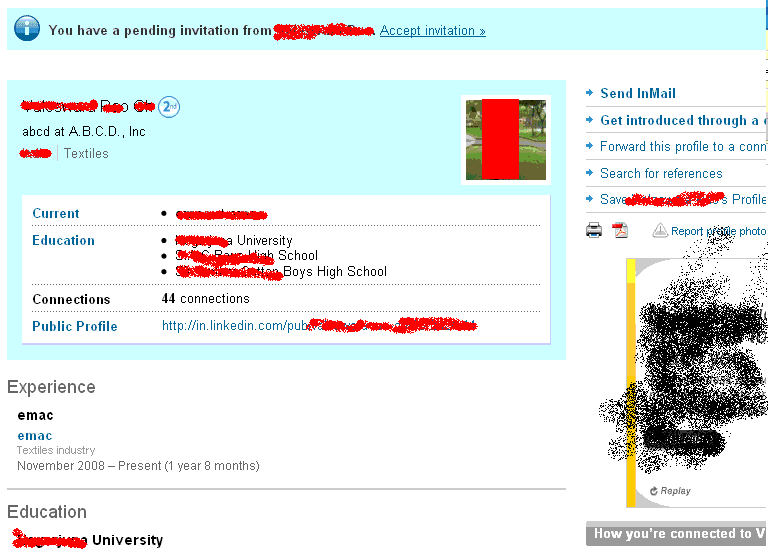As an SAP Mentor, I'm privileged to participate in an SCN forum where we can have closed-door discussions of high technology software topics, sneak peeks into SAP announcements, discuss the merits of development trends, and, once in a while, flame each other with no holds barred. One topic that fascinated me earlier in 2011 was on how we use different social media, starting with the question "How do you respond to linkedin requests from strangers?" I'll paraphrase the responses (rather heavily):
- I reject people I don't know.
- I don't use LinkedIn, because _ _ _ _ .
- I check out their background, and accept if they meet certain criteria
- Another tool is more valuable, because _ _ _ _ .
For my colleagues who embrace LinkedIn, all had a working rule set for accepting contact requests, such as actual previous networking contact, content and/or style of the invitation, and presence or absence of a profile picture. I've followed similar rules of my own, including one that I don't accept invites from people who do not share their contact list. It's a gamble in openness that I see as beneficial, with the potential for a future viral vector destroying my confidence (as the mailto link form did many years ago).
It was interesting to hear from the detractors, who have either minimal or zero interest in LinkedIn. While some are early adopters of pretty much anything new that comes down the street, others are "late adopters" who demand a value judgment before committing their time and resources, and exposing personal information, on the internet. In a presentation I did at an SAP road show (or Insider, or ASUG Chapter meeting, or something), I shared my opinion that LinkedIn is the outsourced (or in the cloud) address book that someone else maintains; others gave similar accounts.
When I began using LinkedIn, it was rather slow progress, until I noticed certain people had, instead of "174 contacts", the somewhat mysterious "500+ contacts". This level seemed to be set as a goal, or special access level, and if you worked diligently to build your network, you too could have the golden "+" sign of an overachiever by your name. It took me at least a year, and several ASUG annual conferences and SAP TechEds to get to that level, but I did (and of course, now there's the 1,000+ as the next plateau; it never ends). Along the way, I had a few warnings from the admin bots telling me I was being rejected too many times because people either forgot who I was, or were just not interested (see above).
Is LinkedIn useful to me? A little, but not a lot. In some cases, I'll look up peoples email addresses that aren't on their SCN business card. But I find often they've used a non-professional address (like gmail instead of corporate) for self-protection, and don't always get answers. I get occasional email from people that I can't answer. Will it help me if I need to find a new job some day? Boy I hope so, for all the seeding and fertilizing I've done.
Are there downsides to LinkedIn (skipping over the conversations about similar networks, or comparisons thereto)? A big one I've seen in the SAP community network context is the broken feed to SCN points. If you've worked hard over time to establish your bona fides, and they aren't visible on your LinkedIn profile, that's bad. From what I can tell, SAP does not have much leverage to fix this, despite owning a minority investment. The bigger one seems to be "groups" which to me turn out to be community sites for flame wars, advertising bombardments, and general mayhem. The plus side of groups is that I can tell a lot about a person by the quantity and quality of their group icons on their profile page. Wearing lots of "fruit salad" doesn't mean you an expert (to me); it means you're a groupie.
What's the future for LinkedIn? One Mentor hinted that they purge their contact lists annually. I'd like to be that disciplined, plus I'd like tools to tell me if I'm leveraging my contacts or not. I'd like to see more about the falsification of history on LinkedIn, such as an automated plagiarism detection tool (see my earlier non-SCN blog about the ABCD firm). Perhaps some Mentors or other early adopters would share their vision?

